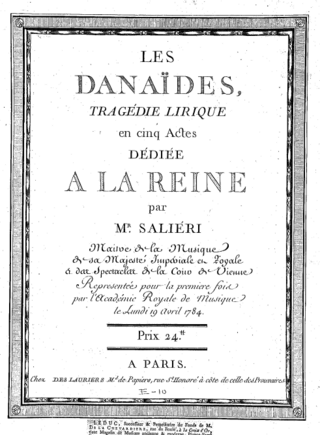
Antonio Salieri was an Italian composer and teacher of the classical period. He was born in Legnago, south of Verona, in the Republic of Venice, and spent his adult life and career as a subject of the Habsburg monarchy.

Francesco Guccini is an Italian singer, songwriter, actor, and writer. During the five decades of his music career he has recorded 16 studio albums and collections, and 6 live albums. He is also a writer, having published autobiographic and noir novels, and a comics writer. Guccini also worked as actor, soundtrack composer, lexicographer and dialectologist.

Giovanni Battista Casti was an Italian poet, satirist, and author of comic opera librettos.

Lorenzo Da Ponte was an Italian, later American, opera librettist, poet and Roman Catholic priest. He wrote the libretti for 28 operas by 11 composers, including three of Mozart's most celebrated operas: The Marriage of Figaro (1786), Don Giovanni (1787), and Così fan tutte (1790).
The French musical ensemble Les Talens Lyriques was created in 1991 in Paris, France, by the harpsichordist and orchestral conductor Christophe Rousset. This instrumental and vocal formation derives its name from the subtitle of Les fêtes d'Hébé (1739) an opera by Jean-Philippe Rameau.
Doralice is a female first name. It is often truncated to Dora or Alice in English. It may refer to:

Les Danaïdes is an opera by Antonio Salieri, in five acts: more specifically, it is a tragédie lyrique. The opera was set to a libretto by François-Louis Gand Le Bland Du Roullet and Louis-Théodore de Tschudi, who in turn adapted the work of Ranieri de' Calzabigi. Calzabigi originally wrote the libretto of Les Danaïdes for Christoph Willibald Gluck, but the aged composer, who had just experienced a stroke, was unable to meet the Opéra's schedule and so asked Salieri to take it over. The plot of the opera is based on Greek tragedy and revolves around the deeds of the mythological characters Danaus and Hypermnestra.
A catalogue aria is a genre of opera aria in which the singer recounts a list of information that was popular in Italian comic opera in the latter half of the eighteenth and early nineteenth centuries.

Vincenzo Pucitta was a nineteenth-century Italian composer. Born in Civitavecchia, he wrote more than 20 operas during his career. One of his works, La Vestale, after its premiere in London (1810), was also sung in Lisbon (1816), Milan (1816) and Rio de Janeiro (1817). He died in Milan.

Il Giorno is an Italian-language national daily newspaper, based in Milan, Italy; it has numerous local editions in Lombardy.
Raúl Giménez is an Argentine operatic tenor, particularly associated with the Italian bel canto vocal style.

Le donne letterate, composed by Antonio Salieri, is an Italian opera in three acts. Stylistically it is an opera buffa and is very similar to the mid-18th century librettos of Carlo Goldoni. The libretto by Giovanni Gastone Boccherini, dancer, poet and stage manager, brother of the composer Luigi Boccherini, was based on Molière's Les Femmes Savantes.

Antonio Sabàto Sr. was an Italian actor noted for extensive work in the Italian exploitation genre. He was the father of model and actor Antonio Sabàto Jr. and Simmone Sabàto. Among Sabàto's starring roles were parts in the Spaghetti Western films One Dollar Too Many and Due volte Giuda.

The Shortest Day is a 1963 Italian comedy film. It is a parody of the war movie The Longest Day and stars the popular duo Franco and Ciccio in the leading roles. Dozens of other well-known actors, from both European and American cinema, agreed to appear in the movie in cameo roles for free to avert the bankruptcy of the production company, Titanus.

Ennio Fantastichini was an Italian actor.

Eternal Melodies is a 1940 Italian historical drama film directed by Carmine Gallone and starring Gino Cervi, Conchita Montenegro and Luisella Beghi. It was one of several musical biopics directed by Gallone. The film was shot at Cinecittà in Rome.

Don Chisciotte alle nozze di Gamace, composed by Antonio Salieri, is an Italian-language opera. The libretto presents the opera as in one act, and the musical score includes a mid-point division, both score, and libretto originally denoted the work a divertimento treatrale. The libretto was written by Giovanni Gastone Boccherini, dancer, poet and stage manager, brother of the composer Luigi Boccherini. The work is loosely adapted from chapters 19 and 21 of Part II of the novel Don Quixote by Miguel de Cervantes. The work was a hybrid opera buffa and ballet, with choreography by Jean-Georges Noverre.

Antonio Giarola born in 1957, is an Italian poet, circus and theater director and circus historian.













